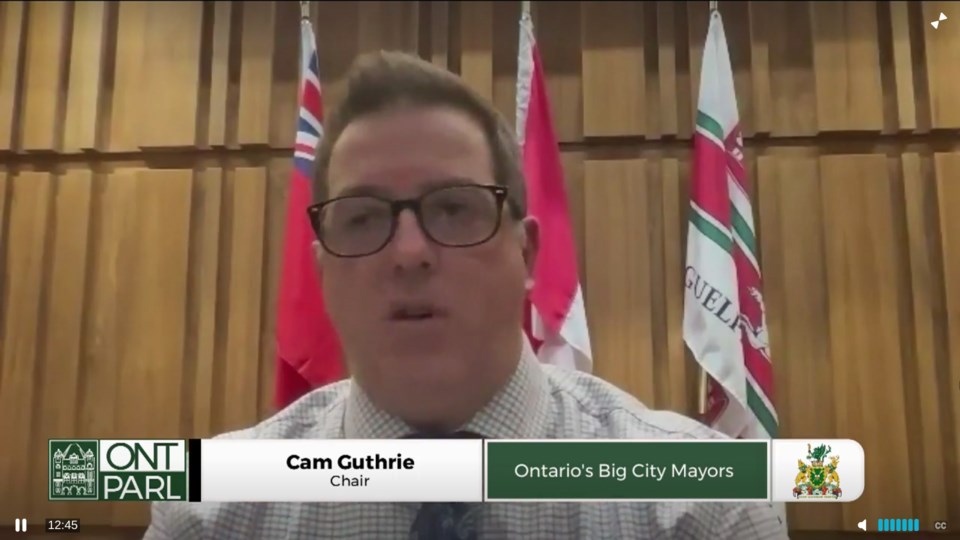Existing property taxpayers will be forced to pay for infrastructure needed to support new housing projects if proposed provincial legislation goes ahead without a way to make up for lost revenue, warns Mayor Cam Guthrie.
Speaking as chair of Ontario Big City Mayors (OBCM), Guthrie signalled alarm bells on Wednesday during a presentation to the province’s standing Committee on Heritage, Infrastructure and Cultural Policy, which is in the midst of gathering feedback on Bill 23, the More Homes Built Faster Act.
The bill proposes reductions to development charges collected by municipalities to fund growth-related infrastructure such as roads, water services and recreation, as well as lessen the requirement for developers to provide parkland or cash in lieu.
“Ontario Big City Mayors does not believe that there’s enough time or capacity to fully appreciate the impacts proposed, especially around parkland and development charges, at the speed that this process is moving,” Guthrie told the committee. “We believe a pause in the implementation of the financial pieces of this legislation is needed.”
The legislation was introduced on Oct. 25, soon passed first and second reading at Queen’s Park and was sent to the committee to gather feedback by Nov. 24.
Guthrie suggested the proposed legislation be taken to the Housing Supply Action Plan Implementation Team so the impact of changes could be discussed by a wider variety of stakeholders, including homebuilders and housing providers, and a “sustainable funding model” could be found that keeps costs off the backs of existing property taxpayers.
“If not addressed, the impact will be billions of dollars worth of infrastructure deficits, severely hurting our ability to support the building of new homes,” he told the committee. “Without development charges, this infrastructure still needs to be built. Municipalities had hoped to see a reference to finding solutions for this deficit in the fall economic statement, as currently, the only way a municipality can afford these costs is through significant property tax increases on the current tax base.”
It’s more difficult to quantify the impact of losing parkland dedications.
“However, if anything was made certain …over the last few years, people loved the outdoors and our parkland space. Especially if increased density is coming, it means a need for more green space, not less,” Guthrie said.
“Parkland is an important part of our community. However, if less of it is being created and the use of privately owned public spaces are allowed to count toward the parkland dedication requirements, it is not clear how councils can guarantee those same spaces for outdoor activities or promote healthy behaviours.”
In a report to council this past April, staff explain the city is hard-pressed to grow its parkland by the estimated 174 hectares needed by 2051 to accommodate the city’s mandated growing population (208,000 residents).
Approved development applications and secondary plans contain about 58 hectares of parkland, but that’s not included in the needs calculation, elevating the total requirement to more than 230 hectares.
During his presentation to the committee, Guthrie further called for the development industry and others involved with housing supply to sign pledges, as municipalities have been asked to, setting specific targets for construction and report annually on steps taken to achieve those goals.
He noted the Canadian Home Builders’ Association recently released its Q3 report which said construction activity had slowed and cited lower builder confidence.
“How can the municipal sector be held to account for outside influences?” Guthrie asked. “This could include how they will work with municipalities to do their part to make sure each city’s specific homebuilding targets are met.”
In an Oct. 25 letter from the Minister of Municipal Affairs and Housing, the mayor previously said Guelph council was asked to pledge its commitment to seeing 18,000 new homes built in the city by 2031 – contributing to a goal of 1.5 million new units throughout Ontario.
A report to the province explaining how the city will meet the pledge is due to the province by March.
“Growth isn’t really paying for growth as it is,” said Guthrie. “Some of the things you're proposing will probably make that worse.”
